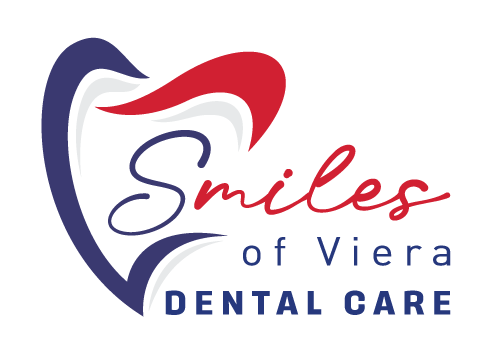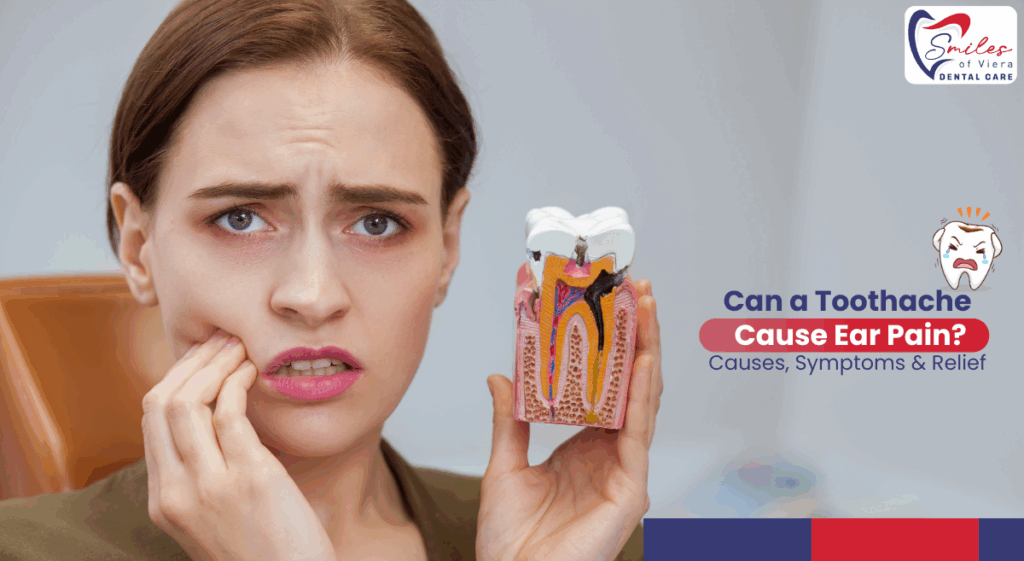- July 22, 2025
- By: Admin@@SMiles0fviEr@
- No Comments
Can a Toothache Cause Ear Pain? Causes, Symptoms & Relief
Have you ever had a toothache that was so painful it hurt your ear too? I am sure you have heard this story many times before from others as well, because many people find it surprising that these two types of pain may be related to each other. This is the reason why dentists get asked this question, “Can a toothache cause ear pain?” more often than some people might believe. Our bodies contain a tangled network of nerves, and sometimes pain in one area can travel somewhere unexpected. In this article, we’ll explore why a toothache might cause ear pain, what warning signs to watch for, and how you can find real relief if you’re dealing with this double trouble.
Why Can a Toothache Cause Ear Pain?
The primary cause why a toothache may lead to pain spreading to your ears is the tricky structure of nerves in your head and face. One of the largest nerves in your head is the trigeminal nerve, which spreads to several parts of the body, such as your teeth, the jaw, and the ears. A toothache or gum infection can cause pain along the nerve, and it may feel like an earache, even though the actual issue is with the tooth.
Other problems with teeth can also be a cause for jaw and TMJ issues, which are located near the ear. The TMJ is where your jawbone attaches to your skull. These issues can cause discomfort, which can radiate to the area around the ear and possibly result in sharp tenderness.
Ear pain from teeth is often related to several common dental issues, which include:
Dental Cavitation/decay: Deep throbbing within a tooth can be a sign of severe tooth decay; this pain can radiate to the ear because the nerve in the tooth has been invaded by the cavity.
Abscessed/diseased tooth: An infected tooth will likely swell and cause pain to radiate to the surrounding tissues, including the ear and/or jaw area.
Impacted wisdom teeth: When impacted, wisdom teeth can damage the nearby nerves and soft tissue, leading to pain that radiates into the ears.
Temporomandibular (TMJ) Disorder: TMJ disorders can create pain in your jaw line that extends to the ears, and sometimes radiates to the neck or upper back.
Sinusitis: As many know, the roots of some upper teeth are very close to the sinuses; therefore, an infection of the sinuses can lead to pressure and pain in the upper teeth and ears.
Our Dentist in Rockledge offers a wide variety of dental services. If you experience any of the problems listed below, we will provide a thorough evaluation and treatment plan to help alleviate the pain associated with the referred ear pain.
Symptoms to be Aware of When it Comes to Toothache vs. Earache
In order to successfully treat your ear problem, we need to determine if the earache is caused by a tooth or another issue.
Toothache Symptoms
- Continuous pain/ache in one or more teeth (shooting or aching)
- Increased sensitivity to hot or cold food/drink
- Gums appear bigger or redder
- Bad breath/bad taste in the mouth
- More severe symptoms, such as fever and/or swollen lymph nodes
Earache Symptoms
- Pain/ache in one or both ears
- Discomfort when trying to hear, a plugged feeling
- Dizziness/loss of equilibrium, headaches
- Fever, discharge from the ear or soreness in the jaw from the ear to the neck area
When to Consult A Dentist Or Doctor
If your ear pain from your teeth is also accompanied by a toothache, swelling, or constant aching, visit the dentist at once. If left untreated, an infection caused by a dental abscess can lead to serious problems, including the potential for the infection to be transmitted to other areas of your body, and into your lung and jaw.
Similarly, if you feel that there is discomfort or soreness in your jaw, and/or have symptoms of TMD (Temporomandibular Disorder) like clicking or being unable to open your mouth, see a dentist or a specialist in TMD to possibly determine what treatment will work best for you.
Treatment Alternatives for Relief of Soreness
There is a variety of relief options depending upon what is causing your soreness:
Surgical and/or Dental Care: If your soreness is tooth-related, it may be relieved by a dentist through professional dental care, such as filling the cavity, doing a root canal or prescribing an antibiotic to eliminate the infection/abscess.
TMJ Therapy: The TMJ treatment would include either medications, fitted mouth guards or possibly physical therapy to alleviate stress from the jaw joint.
Taking pain relievers: Aches of mild to moderate severity are often treated temporarily with an over-the-counter, non-steroid anti-inflammatory drug (such as ibuprofen).
Treating yourself: Cold compresses on your cheek and mouth, using a warm salt water rinse and avoiding eating food that is very hot or very cold will ease the discomfort of the symptom until you see a dentist.
Good Oral Hygiene: Brushing, flossing and regular trips to the dentist all keep infection away from your teeth and gums, and thus prevent the referred ache in your ear.
Learn more about our Dental Services in Rockledge if your dentist suspects an infection or abscess is causing your discomfort.
A Note on Prevention
The worst you can do is to keep the ache that started in your teeth next to other parts of your face. Here, oral health care with proper steps and dental care is the best solution:
- Visit the dentist regularly to treat and prevent tooth decay and gum disease.
- Prevent excessive wear and tear on the jaw joint (TMJ) by avoiding habits that cause you to grind or clench your teeth.
- Promptly seek treatment for a sinus infection; it is very common for sinus infections to travel to your upper teeth and cause pain.
Final Thoughts
To conclude, can a toothache cause ear pain? Absolutely. The relationship between the ear and dental structures is closely related through principal channels of the nerve pathways, and thus, dental issues may be exhibited as an ache in the ears. They may be due to cavity, infection, TMJ disorder, sinus, and trying to stop the pain early will make sure that you are relieved at the earliest, and you will avoid complications.
Whether you have been bothered by tooth pain or soreness in the gums, do not assume to get out with it in a day or two without going to a dental expert. Smiles and health are important, and our doctors at Smiles of Viera would like to assist you in making a bright and ache-free smile your desired dream.
If the ear pain is accompanied by tooth sensitivity, gum swelling, or pain when biting, it may be linked to a dental issue. Shared nerves between teeth and ears often cause tooth pain to radiate to the ear.
Common causes include tooth decay, dental abscesses, impacted wisdom teeth, and temporomandibular joint (TMJ) disorders, all of which can cause pain that spreads to the ear.
Yes, sometimes an infected tooth can cause ear pain as the primary symptom due to nerve connections, even before obvious dental symptoms appear.
A toothache with ear pain may indicate dental issues like an abscess, impacted wisdom tooth, or TMJ disorder, requiring a dentist’s examination to prevent worsening. If dental causes are ruled out, consult a healthcare provider for ear infections or other conditions.
Yes, jaw and ear pain often accompany toothaches because of the close anatomical and nerve connections between these areas.

